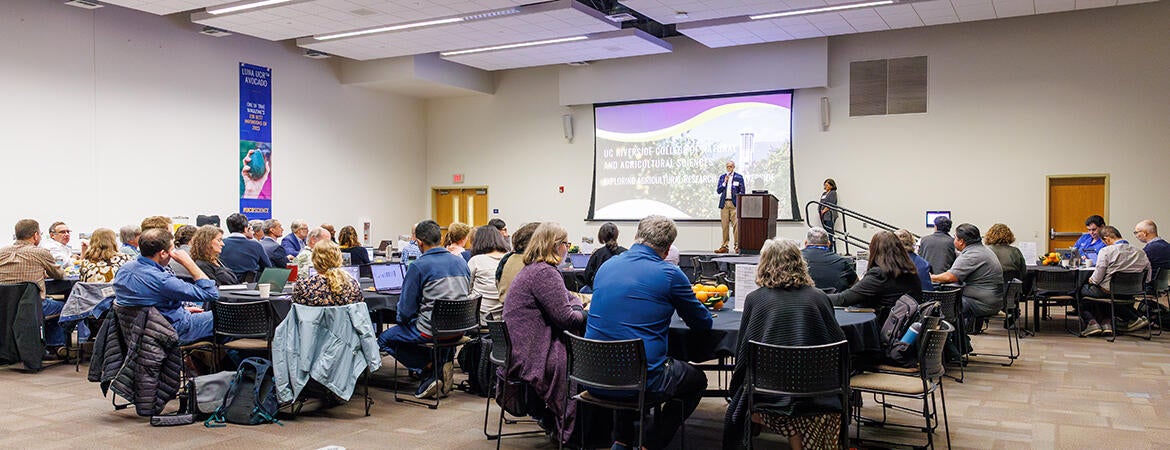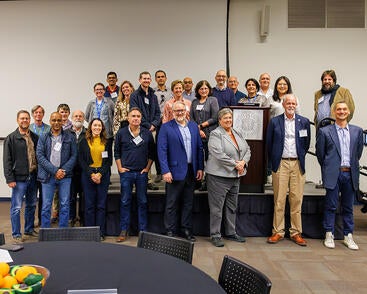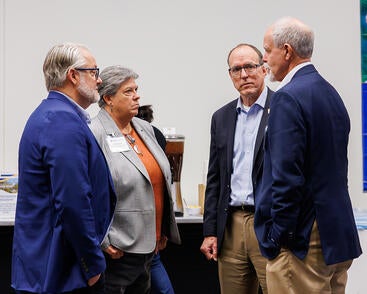
UC Riverside’s College of Natural & Agricultural Sciences (CNAS) convened a meeting of UC Cooperative Extension (CE) Specialists, Advisors, and Faculty to foster collaborations and showcase agricultural research at UC Riverside. The meeting, held Feb. 18, featured researchers and professors from CNAS and BCOE who addressed topics effecting agriculture and natural resources (ANR) that are critically important for the state.
They were joined by keynote speakers and special guests, Glenda Humiston, Vice President, UC Agriculture and Natural Resources, and Brent Hales, Associate Vice President, Research and Cooperative Extension, UC Agriculture and Natural Resources, who represented the UC system at large.
After CNAS Divisional Dean of Agricultural and Natural Resources, Patty Springer, welcomed attendees to the meeting, Peter Atkinson, CNAS Dean, reminded the audience that we are living in challenging times heightened by one universal fact: agriculture is “phenomenally important.”
"UCR builds upon the success of our predecessors, who more than a century ago helped address challenges in the citrus industry," he said. "Our university has been a transformative force for Riverside, Southern California, and across the nation, and we are well-positioned to continue making a meaningful impact throughout the 21st century."
"The UC system is an incredible network of institutions, and UC Riverside plays a vital role within it," he continued. "Today, we celebrate the groundbreaking work of our researchers at UCR.”
In her remarks, Dr. Humiston painted a picture of what UC ANR strives to accomplish. She said: “We cultivate thriving communities, sustainable agriculture, resilient ecosystems, and economic prosperity in California through development and sharing of equitable and collaborative science-based solutions that have national and global impact.”
One initiative she discussed focused on increasing awareness and advocacy for agriculture-oriented policies. "We share your research findings and ensure that individuals receive the necessary training to effectively communicate science to policymakers—not only in the state legislature but also in local government, economic development associations, special districts, and beyond" Ms. Humiston said.
Dean Atkinson views UC ANR as a valuable and dynamic resource. "It’s a highly collaborative effort where, in meetings like this, we can share what we’re doing and how it can be applied in the field. It’s about bridging foundational science with real-world applications to drive meaningful market outcomes. These meetings are essential because they connect scientific research with practical implementation—creating a powerful synergy."
According to Dean Springer, the topics presented at the meeting highlight just a portion of the research currently underway at UCR.
Xylella fastidiosa, a Bacterial Pathogen at the Nexus of Parasitism and Commensalism
Caroline Roper, Professor of Plant Pathology, MPP
Reprogramming Plant Hormone Receptors as Sensors for Biotechnology
Ian Wheeldon, Professor of Chemical and Environmental Engineering
Developing and Deploying Citrus Rootstocks with Tolerance to Huanglongbing Disease
Danelle Seymour, Assistant Professor of Genetics, BPSC
Turfgrass Research and Outreach in California and the Southwest
Christian Bowman, Postdoc, Baird Lab, BPSC
Autonomous Agricultural Robots in Support of Sustainable Crop Production
Konstantinos Karydis, Associate Professor of Electrical and Computer Engineering and Director of the Center for Robotics and Intelligent Systems
Exploring New Opportunities for Control of Cattle Ectoparasites
Alec Gerry, Professor of Veterinary Entomology and CE Specialist, ENT
Amy Murillo, Assistant Professor of Veterinary Entomology, ENT
Advancing Agricultural and Urban Water Management in Southern California Through a Collaborative, Integrated Research and Extension Approach
Amir Verdi, Associate Professor and CE Specialist of Agricultural and Urban Water Management, ENSC
The Nolux Project: Deep Space Food Production System
Nico Franco, CEO & Co-founder, Seedorina
In addition to the opening and closing statements by Deans Atkinson and Springer, other remarks were given by Christopher Lynch, Dean of the Marlan and Rosemary Bourns College of Engineering.
"Our faculty is eager to engage in discussions about solutions and strategies for the challenges facing our state," said Dean Atkinson. "I’m highly optimistic about our local environment, climate, and demographics. The Inland Empire reflects the future demographics of the U.S., giving us a unique opportunity at the College to provide young people with a strong foundation in science—especially in all aspects of agriculture."
He continued, "Many people associate agriculture solely with soil and planting, but it also involves cutting-edge technologies that create future job opportunities. At its core, agriculture is preventative medicine. By developing innovative ways to grow healthy plants, we not only strengthen the food supply but also contribute to public health by reducing illness."

